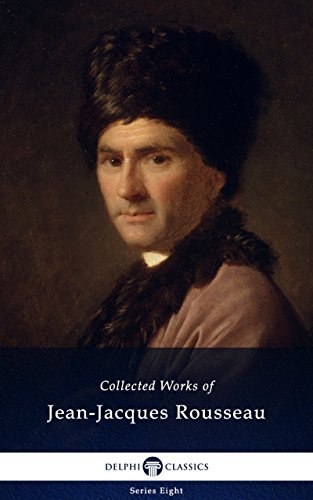
Jean-Jacques Rousseau was a Genevan philosopher of the 18th century, whose works influenced the Enlightenment across Europe, changing the development of modern political and educational thought. His ‘Confessions’, setting the groundwork for the modern autobiography, inspired the late eighteenth century movement of the Age of Sensibility, favouring an increased focus on subjectivity and introspection. This comprehensive eBook presents Rousseau’s collected works, with numerous illustrations, rare texts, informative introductions and the usual Delphi bonus material. (Version 1) * Beautifully illustrated with images relating to Rousseau’s life and works * Concise introductions to the major texts * Features rare treatises often missed out of collections * Images of how the books were first published, giving your eReader a taste of the original texts * Excellent formatting of the texts * Includes Rousseau’s rare unfinished book REVERIES OF A SOLITARY WALKER – available in no other collection * Includes Rousseau’s great autobiography ‘Confessions’ * Special criticism section, with essays evaluating Rousseau’s contribution to philosophy, including Irving Babbitt’s seminal study * Features two biographies - discover Rousseau’s literary life * Scholarly ordering of texts into chronological order and literary genres Please visit www.delphiclassics.com to browse through our range of exciting titles CONTENTS: The Books DISCOURSE ON THE ARTS AND SCIENCES DISCOURSE ON THE ORIGIN AND BASIS OF INEQUALITY AMONG MEN DISCOURSE ON POLITICAL ECONOMY ÉMILE, OR ON EDUCATION THE SOCIAL CONTRACT, OR PRINCIPLES OF POLITICAL RIGHT CONSTITUTIONAL PROJECT FOR CORSICA CONSIDERATIONS ON THE GOVERNMENT OF POLAND REVERIES OF A SOLITARY WALKER The Autobiography THE CONFESSIONS OF JEAN-JACQUES ROUSSEAU The Criticism ROUSSEAU by William Cleaver Wilkinson ROUSSEAU AND ROMANTICISM by Irving Babbitt ROUSSEAU by John Cowper Powys THE RELIGION OF ROUSSEAU by John Middleton Murry COWPER AND ROUSSEAU by Leslie Stephen THE ROUSSEAU AFFAIR by Lytton Strachey ROUSSEAU AND THE SENTIMENTALISTS by James Russell Lowell ROUSSEAU by George Brandes ROUSSEAU IN ENGLAND IN THE NINETEENTH CENTURY by Edmund Gosse The Biographies ROUSSEAU by John Morley JEAN JACQUES ROUSSEAU by Hugh Chisholm Please visit www.delphiclassics.com to browse through our range of exciting titles or to purchase this eBook as a Parts Edition of individual eBooks
Author

Swiss philosopher and writer Jean Jacques Rousseau held that society usually corrupts the essentially good individual; his works include The Social Contract and Émile (both 1762). This important figure in the history contributed to political and moral psychology and influenced later thinkers. Own firmly negative view saw the post-hoc rationalizers of self-interest, apologists for various forms of tyranny, as playing a role in the modern alienation from natural impulse of humanity to compassion. The concern to find a way of preserving human freedom in a world of increasingly dependence for the satisfaction of their needs dominates work. This concerns a material dimension and a more important psychological dimensions. Rousseau a fact that in the modern world, humans come to derive their very sense of self from the opinions as corrosive of freedom and destructive of authenticity. In maturity, he principally explores the first political route, aimed at constructing institutions that allow for the co-existence of equal sovereign citizens in a community; the second route to achieving and protecting freedom, a project for child development and education, fosters autonomy and avoids the development of the most destructive forms of self-interest. Rousseau thinks or the possible co-existence of humans in relations of equality and freedom despite his consistent and overwhelming pessimism that humanity will escape from a dystopia of alienation, oppression, and unfreedom. In addition to contributions, Rousseau acted as a composer, a music theorist, the pioneer of modern autobiography, a novelist, and a botanist. Appreciation of the wonders of nature and his stress on the importance of emotion made Rousseau an influence on and anticipator of the romantic movement. To a very large extent, the interests and concerns that mark his work also inform these other activities, and contributions of Rousseau in ostensibly other fields often serve to illuminate his commitments and arguments.